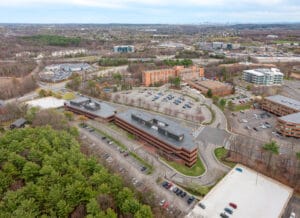
Investors in acres of disconnected, car-dependent real estate along Burlington Mall Road could get incentives to redevelop their properties under budding rezoning plans. Photo courtesy of Newmark
Burlington is blazing a new zoning trail that other suburban towns may be following in coming years.
The redevelopment of old commercial properties into mix-used sites has been under way for a number of years now in Massachusetts, as communities such as Lynnfield, Natick, Newton, Woburn, Westwood, Sudbury and others have approved plans to transform previous single-use sites, such as office parks and shopping malls, into developments with a mix of commercial, retail and residential components.
But perhaps no suburban community has seen more commercial property changes than Burlington, where the largely single-use Burlington Mall, Northwest Park and New England Executive Park (now known as The District) have recently undergone partial or full transformations into mixed-used developments.
Now Burlington is taking it a step further by looking at rezoning entire swaths of the Mall Road-Middlesex Turnpike area, where all three developments and other commercial parcels are located, in attempt to integrate properties into a more coherent, neighborhood-like zone.
Planners are looking at just about everything, from sidewalks, street configurations, shared and structured parking, transportation services, and new public spaces, to diversifying current uses of parcels in the area.
A top goal: introducing more housing into the once predominantly commercial area of Burlington.
“We want to be a model on how suburbs can transform themselves,” said Melisa Tintocalis, director of economic development in Burlington. “We want to be able to shape and guide development over time. We believe this is what we need to do to stay competitive.”
Ambitious Aims Find Support
Currently, Burlington is working on drafting a “framework and principles” of proposed regulatory changes that could be ready for review this spring, Tintocalis said. Then comes the actual crafting of zoning proposals, public hearings and possible Town Meeting votes, all within the next year or two.
There are several related trends running through the Burlington rezoning effort – the recent push for transit-oriented developments, the “live, work, play” philosophy underpinning many urban and suburban mixed-used projects and the emerging “suburban retrofitting” concept championed by those wanting to rid suburbia of the single-use, car-centric developments associated with the 1950s, 1960s and 1970s.
If ambitious rezoning changes are ultimately approved in Burlington, the town will basically be saying: From now on, it’s going to be mixed-used developments in certain parts of town, period.
At least one developer with strong ties to Burlington is supporting the mixed-used rezoning push: National Development, owner of the recently repositioned The District, next to the Simon Properties-owned Burlington Mall.
“We are very supportive of the town’s efforts to proactively engage the various stakeholders along Mall Road in order to chart a course for the future of the area,” said Andrew Gallinaro, a managing partner and director of acquisitions at National Development. “There have been tremendous strides taken over the last several years along the corridor by beginning to integrate a mix of different uses within what has historically been a predominantly commercial zone. We are optimistic about the future of the area and believe that a process which incorporates the viewpoint of private landowners and members of the community can result in a vision for the area that leverages market realities and creates a vibrant and sustainable economic engine for the town.”
Gallinaro – whose firm has also done mixed-used projects in Lynnfield (Market Street), Westwood (University Station) and Sudbury (Meadow Walk) – praised Burlington as a consistent “leader in suburban planning and development over the last several decades” in Massachusetts.
13 Square Miles of Potential Conversions
Marc Draisen, executive director of the Metropolitan Area Planning Council, said Burlington has been “ahead of the curve in doing lots of mixed-used developments” in recent years and he praised the town for “being proactive” in trying to set future mixed-use development goals and guidelines.
But he stressed that the MAPC is working with many other towns in the state to introduce more mixed-used concepts into developments projects, particularly residential components to address the state’s acute housing shortage.
Indeed, Chris Kuschel, a principal planner at MAPC, said officials have identified nearly 13 square miles of strip-shopping malls in the region that theoretically could be transformed into mixed-used sites.
Even if only 20 percent of those parcels – and the ones near transit facilities – were redeveloped, they theoretically could add as many as 136,000 new housing units to the area, he said.
Draisen, Kuschel and others say the trend toward more mixed-use developments should be helped by the recent passage of a new state law requiring towns within the MBTA district to come up with plans for more multifamily-housing projects near transit hubs.
Draisen said he hopes, and expects, that many towns will opt to work with the MAPC and other organizations in coming up with plans to rezone strip malls and other commercial sites in order to comply with the new state law.
“It’s one more incentive to do these mixed-use developments,” Draisen said. “Commonwealth policies are helping move us in this mixed-use direction.”
‘Where the Market Is Headed’
Mark T. Vaughan, a partner at Riemer & Braunstein LLP, agrees the state’s new law linking transit sites to future multifamily-housing projects could push many towns to “rethink how some properties” are used moving forward.
“There’s an opportunity there to look at antiquated [shopping] centers and maybe make changes,” he said.
In Woburn, developers didn’t need government incentives when it came to redeveloping the old and ailing Woburn Mall.
Vaughan’s firm represented one of the partners, Edens LLC, in the recent transformation of the old mall into the “Woburn Village,” complete with 350 new housing units, restaurants and shops – all of them near an MBTA commuter rail station in Woburn.
“The old center was previously antiquated,” Vaughan said. “It needed to be de-malled in order to work.”
Now a number of other properties in Woburn are being eyed for possible redevelopment, following the success of Woburn Village, said Vaughan, without elaborating.
Vaughan, whose law firm has represented both National Development and Simon Property Group in their dealings with Burlington officials, said the push toward more mixed-use suburban developments is not a trend. Sooner or later many towns may insist on mixed-used projects as a matter of policy, as Burlington seems poised to do, he said.
“This is where the market is headed,” he said. “Residents want a mix of conveniences and amenities. Employees and employers want a mix of uses too. This is what people want.”




 |
| 
